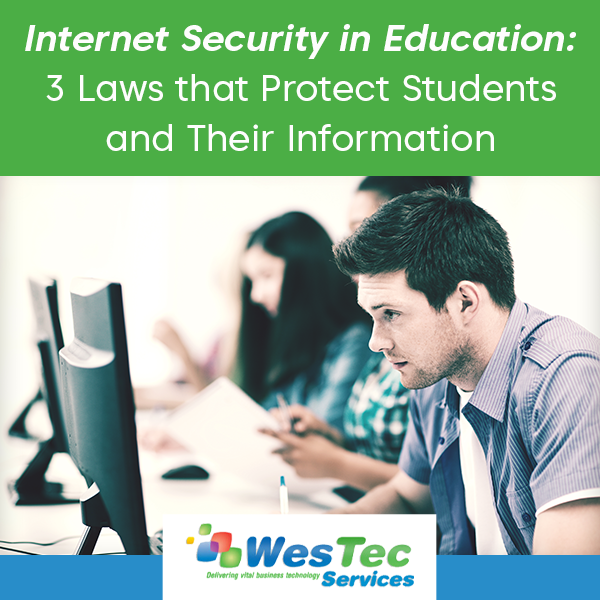
Internet Security in Education: 3 Laws that Protect Students and Their Information
 In the era of technology, some have concerns about their privacy. In schools, the top priority is to protect students and their information. With students constantly engaging in technology, whether it be submitting homework, emails with teachers, or saving documents, state and federal internet security laws protect all this information.
In the era of technology, some have concerns about their privacy. In schools, the top priority is to protect students and their information. With students constantly engaging in technology, whether it be submitting homework, emails with teachers, or saving documents, state and federal internet security laws protect all this information.
FERPA: Family Educational Rights and Privacy Act
FERPA: Family Educational Rights and Privacy Act is one of the most widely known federal laws regarding student privacy. It applies to every educational institution or those of a similar rank. This law protects the education records of all students and sets boundaries between what information students’ parents have access to when the student becomes 18 years of age. If educational records are needed by another school, parent, or in medical cases, there must be a written permission letter from the student or guardian to release that information. Details such as name, birthdate, phone number and school attendance is not under this law and does not require a written permission.
COPPA: Children’s Online Privacy Protection Act
Different from FERPA, COPPA: Children’s Online Privacy Protection Act is specific to the online services used by children 13 years and younger. This act controls what personal information is collected from young children. Applications and websites all have to abide by this act and schools can intervene as parental consent if needed.
 CIPA: Children’s Internet Protection Act
CIPA: Children’s Internet Protection Act
In addition to protecting the privacy of students, it prevents them from seeing unwanted information while on the internet. CIPA: Children’s Internet Protection Act uses a filtered web system that schools and libraries use. This system blocks and hides harmful information or acts such as chat rooms and cyberbullying. CIPA also sets a curriculum on how to protect minors on the internet. This curriculum is required to use this program. Schools and libraries must implement these guidelines addressing a new internet safety policy.
These three acts and laws are a preventative measure from harmful internet activities and exploitation. With the main goal of protecting students’ privacy and engaging them in new internet safety protocols these acts are required by law.
Technology can be confusing, and it’s important to know your rights! Have any further questions on internet privacy? Contact WesTec today! And don’t forget to follow us on Facebook, Twitter and LinkedIn.






 2916 West TC Jester Blvd.,
Suite 104
2916 West TC Jester Blvd.,
Suite 104 sales@westecservices.net
sales@westecservices.net